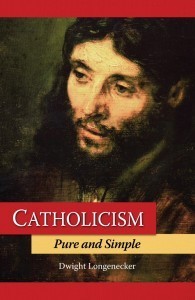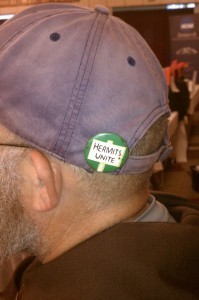Kevin Lowry's Blog, page 7
December 7, 2012
Along the Way – An Interview with Randy Hain
 Among the countless joys of working with The Coming Home Network is meeting the many wonderful guests on the Journey Home program. In certain blessed cases, these individuals have become good friends – among them, Randy Hain. I first came to know Randy through our mutual friend Tom Peterson of Catholics Come Home, who told me about an extraordinary web initiative called The Integrated Catholic Life. Deeply impressed, I then learned that Randy was writing a book on – guess what – living our Catholic faith in the workplace! As readers of this blog know, I loved The Catholic Briefcase: Tools for Integrating Faith and Work
Among the countless joys of working with The Coming Home Network is meeting the many wonderful guests on the Journey Home program. In certain blessed cases, these individuals have become good friends – among them, Randy Hain. I first came to know Randy through our mutual friend Tom Peterson of Catholics Come Home, who told me about an extraordinary web initiative called The Integrated Catholic Life. Deeply impressed, I then learned that Randy was writing a book on – guess what – living our Catholic faith in the workplace! As readers of this blog know, I loved The Catholic Briefcase: Tools for Integrating Faith and Work and would consider starting a fan club for Randy if not for the challenge to his humility!
and would consider starting a fan club for Randy if not for the challenge to his humility!
Given this background, I was thrilled to read an advance copy of Randy’s second book that just came out, Along the Way: Lessons for an Authentic Journey of Faith . It’s a great read, graced with the same humble, practical and authentic approach I appreciate so much from Randy. I had a chance to interview him about the book recently, our conversation follows – enjoy!
. It’s a great read, graced with the same humble, practical and authentic approach I appreciate so much from Randy. I had a chance to interview him about the book recently, our conversation follows – enjoy! 
Grateful Convert: Your first book, The The Catholic Briefcase was a terrific introduction to living our Catholic faith at work. What prompted you to write Along the Way
was a terrific introduction to living our Catholic faith at work. What prompted you to write Along the Way ?
?
Randy: I actually started working on Along the Way before The Catholic Briefcase. It has been a work in progress (much like my faith life!) and I felt the time was right to share it with readers, especially as we are in the Year of Faith. I often transparently share my personal challenges and observations about my faith experiences in my writing and I am hopeful readers will find something of meaning in this new book.
GC: What is the main thing you would like readers to take away from reading the book?
Randy: We are blessed to have a God who loves us and we are made for Heaven, not this world. With these thoughts firmly in mind, I would hope and pray that the reader will find encouragement and practical ideas on how to live out their faith in a courageous and authentic way and connect (or reconnect) to what is true and beautiful about our Catholic faith.
GC: I love the way you share practical tips throughout the book. Are there any particularly hard-won pieces of advice that stand out in your mind?
Randy: Hard-won is a great way to describe them! First and foremost for me was my surrender to Christ at a Mass in 2005 which allowed me to place Him first in my life and put my pride aside. Also, understanding that this surrender and conversion experience needed to be ongoing and that I need to pray for it daily has been a life changing revelation. I am also grateful for the Sacraments, especially the Eucharist and Reconciliation. The powerful gifts of Christ’s body in Mass and the relief I feel after unburdening myself during confession have kept me on track with my faith in ways I may never fully understand, but for which I am truly grateful. Lastly, after saying “no” for the two decades I spent in the spiritual wilderness, I have learned that saying “yes” to Him has made my life immeasurably better. I have much to be grateful for in these powerful lessons!
GC: Do you expect that your non-Catholic friends and business colleagues will be open to what you have to say in the book? Why or why not?
Randy: I think they will be very open! I gave my first book, The Catholic Briefcase: Tools for Integrating Faith and Work, to numerous non-Catholics who enjoyed the book and started using some of the book’s lessons in their own lives. I think Along the Way may be ideally suited as a tool of the New Evangelization. As a former Southern Baptist who experienced two decades of no faith before coming come home to the Truth of the Catholic Church, my conversion story may offer a guide for those interested in learning more about the Church. I will be praying for this to happen!
GC: In the chapter on stewardship, I was struck by your listing of the corporal works of mercy, followed by the line, “Nowhere in the scripture or this list do I see instructions to “write a check” or “donate online.” In today’s world, how can we do a bit better at practicing generosity and detachment?
Randy: I think we start by loving our neighbor. Reach out to those we encounter each day with a spirit of generosity and no strings attached. This generosity may take the form of a friendly greeting, a listening ear, an introduction to your network for a job-seeker or more material support if there is a need. The detachment question is a constant struggle in our society. We are inundated with false messages from the media to buy! buy! buy! in order to attain a happy life, yet material things can never satisfy our hearts. We should spend less time keeping up with our friends and neighbors and put more focus on attaining Heaven.
GC: What’s next for you in terms of your writing? Do you have any future projects in mind?
Randy: Well, in addition to my weekly blog posts for Integrated Catholic Life eMagazine, I have a new book coming out March 1st titled: Something More: The Professional’s Pursuit of a Meaningful Life. The book is a road map of sorts to help professionals get on the right path towards a more meaningful life. Something More is filled with my 20+ years of experiences and observations from working with thousands of professionals and the stories of 15 men and women around the country from various backgrounds who have attained or are trying to attain, more meaningful lives. I am excited about the project and believe it will resonate with anyone in the workforce today.
GC: Thank you so much for taking the time to answer my questions! Is there anything else you’d like to say about the book in order to encourage people to pick up a copy?
Randy: I am grateful for the opportunity to share my thoughts with you. If your readers are looking for a resource filled with practical ideas about living out our Catholic faith and an honest sharing of struggles and lessons learned, Along the Way may be the book they are seeking. Especially in the Year of Faith as we are called to go deeper in our faith, Along the Way can be an ideal companion for the journey.
Thank you Randy! By the way, if you missed it, here is Randy’s Journey Home episode – a highlight from last year.
November 23, 2012
Looking for a Great Christmas Gift?
 We all know that having more stuff doesn’t make people happy.
We all know that having more stuff doesn’t make people happy.
I don’t know about you, but there are a few people on my Christmas list who don’t even want more stuff – they have everything they need, and it’s almost impossible to buy anything meaningful for them. Of course, there are also a couple who want lots of stuff that might not be terribly useful. So what’s a frazzled gift giver to do?
Here’s a modest suggestion: buy them a copy of Faith at Work this Christmas. It’s a gift that offers inspiration, encouragement, and particularly during this Year of Faith, a focus on how to practically integrate our faith and work.
Need an incentive? How about the best sale ever! I stumbled across this idea for speaking engagements – offering one copy for $15 and two for $25. The results were incredible – lots of people want to read the book themselves, of course, but a huge number also bought a copy for someone else who needs it. Don’t we all know at least one other person who would benefit? So the same deal is now available on gratefulconvert.com – just in time for Christmas.
If you want to take it a step further, (and I’m amazed at how many people have done this) ten or more copies are available for the rock-bottom price of $10 apiece. For you economically-minded types out there, you can probably tell that the goal is volume, not margin. A ten percent shipping charge applies on all orders, but is less than the actual shipping costs via either first class or Priority. Orders are typically shipped within 24 hours.
So this Christmas, consider a signed copy of Faith at Work for the faithful (or not-so-faithful) on your list. It doesn’t even matter if they’ve been naughty or nice, this book will help point them in the right direction: towards Christ and His Church.
Have a Merry Christmas!
October 15, 2012
Father Dwight

 Blogger and author
Blogger and author priest Father Dwight Longenecker is a veritable fountain of spiritual wisdom.
priest Father Dwight Longenecker is a veritable fountain of spiritual wisdom.
Father has a new, weekly free newsletter offering practical help for the Catholic life. It’s part of an initiative for the Year of Faith, called FaithWorks! Articles can be found on subjects such as prayer, forgiveness, worship and authentic Catholic spirituality. You can sign up here.
But beyond that, I encourage you to buy a copy of his books. Father Dwight has a gift of insight, and his writing is consistently inspirational. By way of example, check out this piece on forgiveness from his newsletter:
There is a wonderful detail in the story of the Prodigal Son. When the runaway boy is lying in the frozen mud of the pigpen with only slop to eat, the King James Version of the Bible says he ‘came to himself.’
What a profound psychological insight! At the heart of finding forgiveness is the gift to see ourselves as we really are and then turn to ask for help. Reality–true honesty about ourselves and other people must be at the heart of all forgiveness.
Forgiveness, by it’s very definition, involves a truthful relationship. To be forgiven we must see ourselves as we really are. To forgive others we must see them as they really are. This is difficult because all of us mask our true selves with the person we wish we were or the person we would like others to believe us to be. When we ‘come to ourselves’ we are able, perhaps for the first time to find forgiveness.
The next step for the prodigal son was to decide to get up, dust himself off and head home to the father. This step requires courage. When seeking forgiveness in a relationship with another person it is easy to skirt the issue, avoid the person and hope that the problem will take care of itself. Did they say ‘time heals all wounds’? They were lying. Time, on its own, doesn’t heal anything. Forgiveness doesn’t happen by itself. We need to take action. We need to get up out of the mud and head on home where we will find reconciliation and peace.
This is true in our relationships with one another, but it is also true in our relationship with God. We have to first see ourselves as we really are, then we need to see God as he really is. Here’s the great part! God looks on us with pity not with blame. He is the loving father waiting to welcome us home.
If you want to find true forgiveness ask God for the gift to see yourself as you really are–both the good and the bad–and then ask for the gift to see God as he truly is. When that truth comes thundering into your heart and life you will be on the path to finding forgiveness–that path that leads to the warm welcome of your true home.
- Fr. Dwight Longenecker, Finding Forgiveness – 4
Thanks, Fr. Dwight, for your tremendous work and encouragement!
October 1, 2012
Our Sunday Visitor – Beacon of Hope
 One of the great joys of my life is serving on the Board of Directors for Our Sunday Visitor (OSV). On Friday, September 28, 2012, an extraordinary event unfolded in Ft. Wayne, IN commemorating the centennial for the publishing company established by Archbishop John F. Noll.
One of the great joys of my life is serving on the Board of Directors for Our Sunday Visitor (OSV). On Friday, September 28, 2012, an extraordinary event unfolded in Ft. Wayne, IN commemorating the centennial for the publishing company established by Archbishop John F. Noll.
A symposium began the celebration, with speakers Cardinal Francis George (please pray for the Cardinal’s health as he undergoes cancer treatment over the next few months), Helen Alvare of George Mason University School of Law (check out her new book Breaking Through: Catholic Women Speak for Themselves !), and prolific author
!), and prolific author and friend Dr. Scott Hahn from my alma mater, Franciscan University of Steubenville. It was tremendous.
and friend Dr. Scott Hahn from my alma mater, Franciscan University of Steubenville. It was tremendous.
Following the symposium, Mass was held at the Cathedral of the Immaculate Conception in Ft. Wayne, and included members of the Noll family along with many others associated with OSV from far and wide. Bishop Kevin Rhoades presided at Mass, and gave a stellar homily recalling the history of Archbishop Noll and OSV. The evening then wrapped up with a reception and banquet, including talks by Bishop Claudio Maria Celli from the Pontifical Council for Social Communications.
I could go on about the incredible event, the fantastic people, and the amazing vision of Archbishop Noll… but instead, I’d like to invite you to watch the following video. If you’re already familiar with OSV, you might be surprised at the scope of the organization – and if you’re not, you’re in for a treat. This is a jewel of the Catholic Church in the U.S., and it provides a beacon of hope for people around the world. Enjoy!
September 20, 2012
Applied Leadership
 My MBA was in “Applied Leadership.” It took an enormous amount of time and sacrifice to complete, yet I’m still not sure that I could provide a concise definition of exactly what “applied leadership” means.
My MBA was in “Applied Leadership.” It took an enormous amount of time and sacrifice to complete, yet I’m still not sure that I could provide a concise definition of exactly what “applied leadership” means.
Thankfully, I know it when I see it.
One of the most head-spinning times in my life was right around my 40th birthday. First came the birthday itself, complete with far too much hand-wringing on my part. Then I was offered a terrific promotion to Senior Vice President of my employer. A few days later, I officially graduated with the MBA. Finally, a couple days after that, our eighth child was born. This all happened within a ten day period. It was an incredible time, full of excitement and high expectations.
Several years later, I continue to be fascinated with leadership and its application. In a sense, my book Faith at Work: Finding Purpose Beyond the Paycheck is a reflection on Christian leadership and how we can grow in our faith and our work acumen simultaneously by living the virtues in the workplace. As a result, I’m grateful for the Church’s efforts to better articulate the essence of leadership in timeless terms.
Consider this:
In the Gospel, Jesus tells us: “From everyone who has been given much, much will be demanded; and from the one who has been entrusted with much, much more will be asked” (Lk 12:48). Businesspeople have been given great resources and the Lord asks them to do great things. This is your vocation. In this young century alone, many businesses have already brought forth marvellous innovations which have cured disease, brought people closer together through technology and created prosperity in countless ways. Unfortunately, this century has also brought business scandals and serious economic disturbances, and an erosion of trust in business organisations and in free-market institutions generally. For Christian business leaders, this is a time that calls for the witness of faith, the confidence of hope, and the practice of love.
- Vocation of the Business Leader: A Reflection (#1)
So the question is, how can we best apply this in our daily lives? Regardless of our perception of the relative much-ness of our resources, we know there are those who have come from little and built a lot (think Tom Monaghan and Domino’s Pizza). Likewise, we’re all aware of a growing list of organizational catastrophes (think Enron) where the lot became little – very quickly.
We are often tempted to think in purely financial terms, since those types of things are easy to measure. But take the same concept of rags to riches or its reverse, and apply it to the spiritual life. Presto – we all have an opportunity!
When we go to work, or when we seek to better ourselves in our work or profession, we are serving God. The beauty (and the challenge) of our humanity is found in applying the individual gifts we have been given in accordance with our calling… our vocation. There is no single way this is accomplished, rather it’s done through the infinite permutations of skill sets both within individuals and teams of individuals. Although we know there are many pitfalls, by living our faith we can be instruments of innovation… cure disease… bring people together… create prosperity… in short, serve human need in a profound and effective manner.
To the extent we live the virtues in our work, and embrace “the witness of faith, the confidence of hope, and the practice of love” we establish fertile ground for both individuals and organizations to flourish. Maybe that’s one example of “applied leadership” for those who seek more than a paycheck.
The Lord is asking you to do great things in your work, by living the virtues and being completely faithful to Him. Are you ready?
Please consider supporting grateful convert initiatives by ordering a copy of Faith at Work: Finding Purpose Beyond the Paycheck (quantity discounts are now available for group study) or inviting Kevin to speak at your event. Thank you!
September 13, 2012
Vocation of the Business Leader
 What does the faith have to do with business?
What does the faith have to do with business?
According to many people I’ve encountered, the answer is: nothing.
Thankfully, not everyone thinks that’s true. Recently, the Pontifical Council for Justice and Peace released a new resource entitled Vocation of the Business Leader: A Reflection. It’s well worth reading. Consider the following two paragraphs from the document’s Executive Summary:
When businesses and market economies function properly and focus on serving the common good, they contribute greatly to the material and even the spiritual well-being of society. Recent experience, however, has also demonstrated the harm caused by the failings of businesses and markets. The transformative developments of our era—globalisation, communications technologies, and financialisation — produce problems alongside their benefits: inequality, economic dislocation, information overload, financial instability and many other pressures leading away from serving the common good. Business leaders who are guided by ethical social principles, lived through virtues and illuminated for Christians by the Gospel, can, nonetheless, succeed and contribute to the common good.
Obstacles to serving the common good come in many forms —lack of rule of law, corruption, tendencies towards greed, poor stewardship of resources—but the most significant for a business leader on a personal level is leading a “divided” life. This split between faith and daily business practice can lead to imbalances and misplaced devotion to worldly success. The alternative path of faith-based “servant leadership” provides business leaders with a larger perspective and helps to balance the demands of the business world with those of ethical social principles, illumined for Christians by the Gospel. This is explored through three stages: seeing, judging, and acting, even though it is clear that these three aspects are deeply interconnected.
- Vocation of a Business Leader: A Reflection (Executive Summary)
As a grateful convert to the Church, I continue to learn from and appreciate the richness in her teachings. The topic of this document is of particular interest, having spent over twenty years in financial and leadership roles. Among the joys of my life is involvement in the Columbus chapter of Legatus, a wonderful organization of business leaders (I am privileged to serve as President of the chapter this year). Of course, having written the book Faith at Work: Finding Purpose Beyond the Paycheck and now speaking frequently on the topic, I’m always looking for good material too!
So what better way to celebrate a solid document than to launch a series based on its reflections? That’s what I’m looking forward to doing here at grateful convert. I hope it inspires you to consider the opportunities our work provides to grow in our faith, and to truly put ourselves at the service of God and others in our lives.
One of my favorite parts of the executive summary is its warning against leading a “divided” life, and exhortation to “servant leadership.” I look forward to exploring these topics in greater depth in future posts. Many thanks to Peter K. A. Cardinal Turkson (pictured above) for his leadership of the Pontifical Council for Justice and Peace and this wonderful reflection.
As a final note, I can’t resist thanking two more people for their inspiration and friendship: fellow authors Randy Hain and Andreas Widmer.
Randy is the author of The Catholic Briefcase: Tools for Integrating Faith and Work and the forthcoming Along the Way: Lessons for an Authentic Journey of Faith. He and Deacon Mike Bickerstaff founded the Integrated Catholic Life e-Magazine, and it’s a tremendous resource for those seeking the antidote to the aforementioned “divided” life! Randy has been a constant source of encouragement for me over the past couple years, and it would be difficult for me to overstate my regard for him as a business leader, family man, and committed Catholic.
Andreas Widmer is a former Swiss Guard who authored the book  The Pope & The CEO: John Paul II’s Leadership Lessons to a Young Swiss Guard
The Pope & The CEO: John Paul II’s Leadership Lessons to a Young Swiss Guard and just unveiled a new web initiative, Catholic Mental Models. It’s well worth checking out. I loved his book, and am sure to be following his work for many years to come.
and just unveiled a new web initiative, Catholic Mental Models. It’s well worth checking out. I loved his book, and am sure to be following his work for many years to come.
Many blessings on your faithful work!
Please consider supporting grateful convert initiatives by ordering a copy of Faith at Work: Finding Purpose Beyond the Paycheck (quantity discounts are now available for group study) or inviting Kevin to speak at your event. Thank you!
July 31, 2012
Hangin’ With A Hermit
 The Defending the Faith Conference at Franciscan University of Steubenville (my alma mater) is a highlight of the year. Fabulous speakers. Cool people everywhere. Tons of priests available for confession. The Portiuncula Chapel indulgence. What can be better?
The Defending the Faith Conference at Franciscan University of Steubenville (my alma mater) is a highlight of the year. Fabulous speakers. Cool people everywhere. Tons of priests available for confession. The Portiuncula Chapel indulgence. What can be better?
Hangin’ with a hermit at Defending the Faith.
Meet Brother Rex, my good friend, and a bona fide, real-deal hermit. Yep, he’s a Franciscan, diocesan hermit, completely legit under canon law yet something of a walking contradiction.
He’s the most gregarious hermit I’ve ever met.
Now, to be fair, I’ve never met another bona fide, real-deal hermit. But even if I had, I doubt they would measure up to Br. Rex’s fun loving, wacky and constant stream of interactions with everyone he met. There were the Franciscan U. students Br. Rex tormented, usually with a straight face but immediately followed with peals of laughter (on both sides). His insistence on addressing me as “Mr. K.” His ball cap, complete with a button: Hermits Unite.
 He was getting on my son T.J., working in the conference office this summer, for blowing us off for lunch. “Tell T.J. he’s giving me a complex. I might need to talk to a counselor. Hey, I am a counselor! I can talk to myself!”
He was getting on my son T.J., working in the conference office this summer, for blowing us off for lunch. “Tell T.J. he’s giving me a complex. I might need to talk to a counselor. Hey, I am a counselor! I can talk to myself!”
So a fantastic weekend was made even more enjoyable due to Br. Rex’s antics. The guy is so funny, and he reminds me of what my buddy Mike Aquilina might look like if he were auditioning to play in ZZ Top.
A fantastic weekend it was, too! Where to even begin? How about meeting Dr. Janet Smith! I’ve been a fan of hers for many years, and was thrilled to meet her in person. We had a great Coming Home Network social on Friday, always a great time. Steve Ray was there, renowned globetrotter, pilgrimage guide, and class act. Scott Hahn was his usual brilliant self – he can’t open his mouth without saying something profound. Patrick Madrid, the guy who gave me my first big break in writing by publishing my conversion story, just keeps getting better, much like the fine wine he enjoys every now and again. Jenn Giroux and Collin Raye were in town, and Jenn’s daughter Andrea Thomas, an extraordinary singer in her own right, sang with Collin at a coffeehouse social on Saturday night.
 I didn’t get to say hello, but the other person I always love to see is Kimberly Hahn, who represented the tipping point for my beautiful wife Kathi’s conversion to Catholicism. The two of them spent a couple hours talking through various issues one night at the “Hahn hotel” and presto – by God’s grace, Kathi decided to go through with it. Amazing.
I didn’t get to say hello, but the other person I always love to see is Kimberly Hahn, who represented the tipping point for my beautiful wife Kathi’s conversion to Catholicism. The two of them spent a couple hours talking through various issues one night at the “Hahn hotel” and presto – by God’s grace, Kathi decided to go through with it. Amazing.
It’s probably worth mentioning that I gave away a couple books too, including one to Congressman (and FUS alum) Jeff Fortenberry. I had an opportunity to meet the Congressman for the first time and was deeply impressed. Here’s a guy who needs our prayers, and is fighting the good fight for our religious freedom. I hope Faith at Work is an encouragement to him – he sure can use it!
It was such a great weekend – I didn’t even mention Archbishop Robert Carlson‘s outstanding homily on Saturday, Ralph Martin‘s terrific talk on Friday evening, or the fact that I met Matt Fradd from Catholic Answers too. Then there were the many good friends and folks I hadn’t seen in some time – media star Mike Hernon (FUS VP for Advancement), Mark Nehrbas, Jack Rook, and CHN folks including Marcus, Jon Marc, Teresa, and Dominic Grodi, Dr. Ken Howell, Mary Clare Piecynski, Bill and Laura Bateson, and… Br. Rex.
So let’s end it there. If you ever get a chance to attend the Defending the Faith conference, I encourage you to jump at it. And in the event you ever get a chance to hang out with a hermit, do it. There’s something to be learned. You see, not only is Br. Rex a gregarious hermit (is that sort of like jumbo shrimp?) but he’s a man of prayer. I think that’s why he’s also a man of great joy.
July 14, 2012
Are You Goal Oriented?
 Have you ever been so focused on achieving your goals that you’ve run people over in the process?
Have you ever been so focused on achieving your goals that you’ve run people over in the process?
I sure have. In today’s workplaces, it’s more important than ever to meet our goals, and we’re under lots of pressure to be productive and efficient. Unfortunately, this can cause plenty of interpersonal problems, since we all act differently when we’re under pressure.
Here’s one illustration of what not to do. A friend of mine became very unpopular at work by being so focused on achieving her own goals that she treated co-workers as distractions! Unfortunately, this story didn’t end well. She completed her own tasks efficiently, but couldn’t understand why the rest of the team resented her. The situation caused so much turmoil in her department that she ended up leaving the company.
So how do we avoid this pitfall and its various permutations? Particularly for people of faith, how can we achieve legitimate goals – and love one another like Christ loves us?
One of the cool aspects of being Catholic is having so many tremendous role models, past and present. When it comes to achieving goals and valuing people, one of the best examples I can think of is Blessed John Paul II.
Andreas Widmer, a Swiss Guard during the pontificate of John Paul II, wrote an outstanding book entitled The Pope & The CEO: John Paul II’s Leadership Lessons to a Young Swiss Guard in which he describes an astonishing interaction with the Pope. Andreas was a young man at the time, spending his first Christmas away from home. On Christmas Eve, as the Pope went about his duties (achieving goals), he noticed that Andreas was new and immediately recognized Andreas’ sadness. The Pope took just a few seconds to speak with Andreas, precious seconds that Andreas recalls vividly years later. Here’s how Andreas describes the incident in the book:
in which he describes an astonishing interaction with the Pope. Andreas was a young man at the time, spending his first Christmas away from home. On Christmas Eve, as the Pope went about his duties (achieving goals), he noticed that Andreas was new and immediately recognized Andreas’ sadness. The Pope took just a few seconds to speak with Andreas, precious seconds that Andreas recalls vividly years later. Here’s how Andreas describes the incident in the book:
“That was all I needed. Someone had noticed my pain, someone had cared, and that someone was the Pope himself. In that moment, I felt comforted. Now, looking back, I feel amazed. Here was the leader of a billion Catholics, at the height of some of his fiercest battles, occupied with the most overwhelming and impossible problems of the century, yet he was still sensitive enough to perceive the emotions of a twenty-year-old guard whose sole job was to blend into the background as he passed.”
This story (along with many others in the book) has inspired – and convicted – me ever since the first time I read it. I tend to be… ahem… a little on the preoccupied side, sort of like an absent-minded professor minus the Ph.D. Think about the goals of Blessed John Paul II. They were enormous goals! Can you imagine the impact of someone with such goals taking an interest in you personally? Even for a few seconds?
Yet on a lesser scale, this is what we’re called to do. Achieving goals is important. At the same time, people are the primary goal of our lives. Serving people, honoring people, sometimes just noticing people. And getting our work done! For some of us, the balancing act doesn’t really come naturally. But we need to do our best.
Our work serves legitimate human needs, and by treating others as precious to God, no matter who they are, we honor our Lord. Let’s pray for one another, and do our best today to remember Blessed John Paul II’s example. Let’s take a few precious seconds today as we go about achieving our goals and reflect the love of Christ to someone else. After all, serving people is the goal of our work.
June 18, 2012
Free Rosaries for Everyone!
 I think the rosary is one of the coolest devotions ever.
I think the rosary is one of the coolest devotions ever.
In fact, the rosary is so cool, I recommend it for everyone. Praying the rosary was a decisive tipping point in my conversion to Catholicism. Some guy named Scott Hahn gave me my first rosary – and get this – it was FREE. Or at least, I didn’t pay for it. Maybe Scott did, I don’t know, and don’t really care. It didn’t cost me a dime.
So here’s an idea. Rosaries are cool, and free rosaries are even better. What if we petitioned the government to buy them for us?
If the government buys them, they’re free, right? Or at least, we wouldn’t have to pay for them. Yes, I know some non-Catholics might find this morally objectionable, but who cares? The government wants Catholics and Catholic organizations to pay for contraceptives, sterilizations and abortion-inducing drugs, this is just a little tit-for-tat action. That happens in politics, doesn’t it? Surely the administration would see this as an opportunity, right?
I thought about this long and hard, and here are just a few reasons why government mandated rosaries would be awesome:
1. They’re for men too. Rosaries are great for everyone! This isn’t just a women’s issue, everyone could rally around the proposal. People love free stuff!
2. Rosary manufacturing would create jobs. We all know voters are focused on the economy. Think of all the jobs this would create for people who have fallen on hard times over the last few years.
3. There are no health risks. I don’t know anyone who has been injured or gotten sick due to praying the rosary. No increased cancer risks, no sexual side effects (well, it could make the latter even better for married folks, I suppose).
4. Funding is easy as pie. Maybe a tax could be levied on contraceptives. Yeah, that would pay for it, no problem.
5. The international community wouldn’t mind. We could even suggest the idea to the U.N. and our allies, and import a certain percentage of our rosaries from developing nations.
6. The proposal would have no impact on gas prices. I doubt rosary making would move the needle much at all. Maybe it would even help, if we all prayed for gas prices to fall.
7. Kathleen Sebelius would get one. But she wouldn’t be required to use it. We would leave that to her conscience.
It’s a pretty good idea, right? If we’re all about equality and tolerance, then the culture of death needs to be balanced out by a bunch of rosary-praying Catholics, and anyone else for that matter. We’re ultra-inclusive, everybody is welcome!
Once people get to know us, the fear of Catholics will inevitably decrease. They’ll understand that we’re not looking to run Cardinal Dolan for President (tempting, but he can’t), that we’re certainly no better than anyone else, and that we’re grateful to be here. We pray for people, we’re against terrorism, and we care about poor people. We makes mistakes, we apologize, and we try to do better.
The problem with our current trajectory is that inevitably, religious freedom – and freedom itself – is attacked. Just look at what’s happening in Canada. If we all had rosaries, and used them, perhaps things would get better. That would provide some real hope and change.
June 14, 2012
What the – Hell?
 I had a really weird dream the other night. You know, the sort of puzzling, surreal, yet completely vivid dream that leaves you scratching your head the next day. It completely freaked me out.
I had a really weird dream the other night. You know, the sort of puzzling, surreal, yet completely vivid dream that leaves you scratching your head the next day. It completely freaked me out.
I was in hell.
Now, here’s where it gets surreal. Well, admittedly, the whole thing was surreal. When I “came to” in the dream, I was alone, and equipped only with a hand saw. Yes, a hand saw. Don’t ask me why.
In an instant, I became aware of others around me, similarly equipped. They were fighting, everyone for himself (or herself, although this was a genderless existence). There were no alliances. Everyone was together, but thoroughly alone.
The thought struck me immediately, “People are really going to get hurt, fighting with these things.” I mean, how can you not? I soon realized that people were indeed getting hurt, with screaming and wailing all around.
At that point, it dawned on me: there’s no going back. Once you’re in hell, you’re there. No do-overs. The sinking feeling stuck with me until I awoke, thanking God it was just a dream.
So where does one go with this type of experience? Doubtless there are those who could provide colorful psychoanalysis about the state of my wretched soul. Theologians might rightly question the hell-with-a-handsaw motif.
Yet in reflecting on the dream over the past couple days, I arrived at a couple impressions. In no particular order, here they are:
1. If we really understand the reality of hell, we will do everything possible to avoid it
2. The pain of hell is real, and probably worse than people fighting with hand saws
3. Once you’re in hell, there is no hope
All the above viscerally reinforces my gratitude for being Catholic. I love that our faith provides the antidote to hell – the sacraments, including baptism and confession. It’s a happy fact that the Church doesn’t render judgement that any individual, even Judas, is in hell. Jesus (echoed by Blessed John Paul II) made it clear that there are people who are in hell, mind you, but the Church focuses her spiritual due diligence on saints. It’s a good thing.
Just yesterday, I came across a neat little blog post including a video by Jimmy Akin, apologist extraordinaire at Catholic Answers. (Brief info break: I’ll be a guest on Catholic Answers live Monday June 18 from 7-8 p.m. EST, please pray for me!) I’ve never met Jimmy, but admire him tremendously (the jury is still out on the beard). He points out that no one is “sent to hell” by God, rather they choose separation from God, thereby choosing hell for themselves. It’s a rather critical distinction, and important to understand.
One of the most appealing things about the Church is precisely its message of hope in the midst of our sinful world. We all have the ability to avoid hell, given our freewill to say yes to God, until our dying breath. Let’s pray for one another, and ask God for the grace to recognize the reality of hell, and avoid it at all costs through lives of virtue and total abandonment to Christ.



